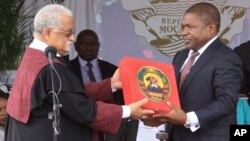Mozambique celebrated 40 years of independence on Thursday, holding military parades as it angled to emerge from generations of persistent, desperate poverty.
The recent discovery of an estimated 180 trillion cubic feet of off-shore gas — enough to supply Germany, Britain, France and Italy for nearly two decades — is a reason for caution, according to a new report by London-based Chatham House.
"Despite the rhetoric, experience shows that ... good things happen slowly, while bad things can happen very fast," concluded the study that urges Mozambican leaders to be judicious in deciding how to leverage the newfound resources.
“This 40th anniversary of independence in Mozambique is a watershed, because Mozambique could go wrong," Alex Vines, head of the think tank's Africa program and the report's lead author, said.
Speaking to VOA via Skype from London, Vines described Mozambican leaders at a crossroads: on one side is the ability to create widespread prosperity; on the other is the infamous “resource curse” that has sparked conflict, anger and inequality in resource-rich nations such as Angola, Congo, and Nigeria.
"This is what ... Mozambique to 2018 is all about: outlining what those really important choices are," said Vines. "In the next decade, Mozambique will be transformed by this gas. … The poverty indicators are getting worse in the most populated parts of the country, such as Zambezia, Nampula and Sofala provinces. It’s no coincidence that these are the three provinces where opposition parties ... are strongest.”
While newly-elected President Felipe Nyusi has built a more adept technocratic government, presented a leaner budget and attempted to reduce waste and corruption, Vine says he will need to work with the nation’s truculent Renamo opposition, which has threatened to plunge the country back into war nearly a quarter-century after resolving a bloody civil conflict.
And because Mozambique remains among the world's five poorest countries, Vines calls economic development Nyusi’s biggest challenge.
“Unless the government has more equitable growth across the country," not just in the politically privileged capital or the gas-rich Frelimo stronghold in the north, which is also Nyusi's home, then the country could follow an alarming trajectory, he said.
Mozambique's enormous youth population and high unemployment means annual economic growth rates of 7 percent won't be enough to meet expectations of its estimated 26 million people.
The country's leading independent daily newspaper Noticias described Nyusi in an editorial on Thursday as having "room for more than 20 million Mozambicans who are hopeful that their desires and concerns will be addressed."
Working Mozambicans earn an average of just $650 a year.
But Nyusi seemed nonetheless optimistic on Thursday.
"The future is in our hands," he told the crowd gathered at the Independence Day celebrations.
"Mozambique has all the conditions to emerge within the next decade as a united and economically strong country," he said.
Portions of this report are from Reuters.




